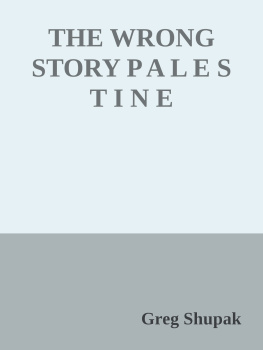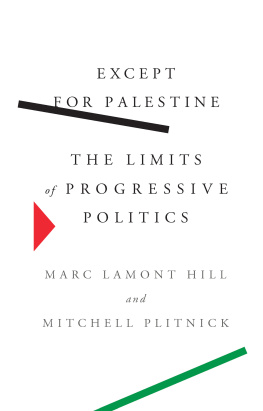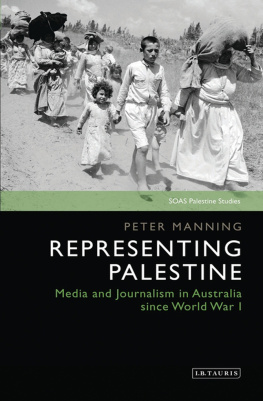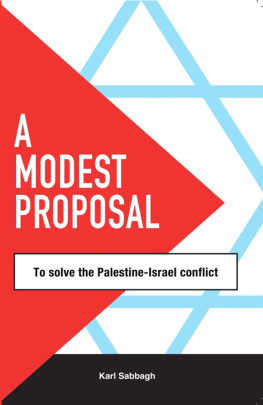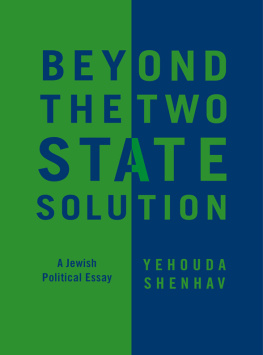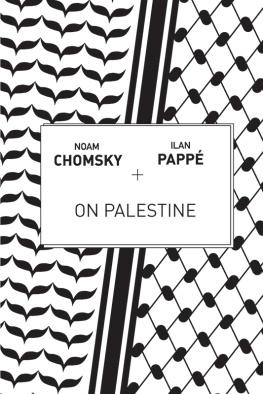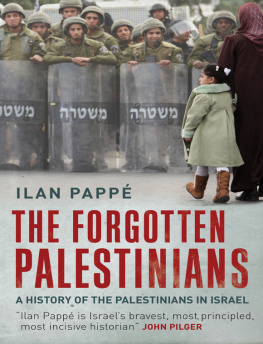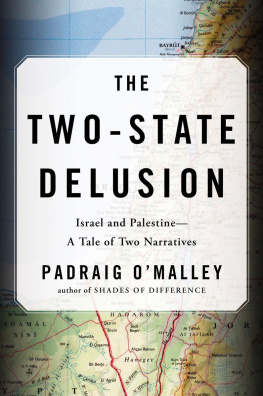the wrong story
Palestine, Israel, & the media
GREG SHUPAK
ADVANCE PRAISE FOR THE WRONG STORY
Greg Shupaks book is a nuanced, engaging and accessible deconstruction of the often distorted media narratives around Palestine/Israel. He compels the reader to see beyond simplistic headlines and overly rehearsed soundbites. Rafeef Ziadah, University of London, author and performer of We Teach Life
By refusing the both sides narrative Greg Shupak reminds the reader of the asymmetrical relation between the colonizer and the colonized ... Distortions, falsifications and omissions, the author asserts, have largely been characteristic of existing media. I highly recommend this book for media students and experts. Nahla Abdo, Carleton University, author of Captive Revolution
Shupaks The Wrong Story is a crisply written yet formidable analysis of some of the key tropes underlying media narratives surrounding Palestine-Israel. Neatly organized around the New York Times coverage of Israels attacks against the Gaza Strip in 2014, the book powerfully reveals the hidden histories of colonization, dispossession, and occupation. Adam Hanieh, University of London, author of Capitalism and Class in the Gulf Arab States
A powerful and insightful analysis that confronts, challenges and exposes the systematically deceptive frameworks and narratives in English-language mainstream media regarding Palestine and the Palestinian people. Shupaks careful and precise work lays bare the colonial realities that are routinely evaded by major corporate and official media. Charlotte Kates, International Coordinator, Samidoun Palestinian Prisoner Solidarity Network
Gregory Shupak dismantles the mainstream English-language press deeply problematicand falsenarrative about Palestine ... Give this book both to those interested in learning (or unlearning) about Palestine, and to those eager to learn about deconstructing the medias lies and, unfortunately, all too often the false framing of the so-called human rights organizations. Rania Masri, Professor
In the tradition of Norman Finkelsteins work, Shupak uses evidence to challenge three dominant narratives presented by the mainstream media about the Israeli-Palestinian conflict.. This book is a great teaching tool about the Israeli occupation of Palestine for university students as well as general audiences. Angela Joya, University of Oregon
In his judicious study of corporate media narratives on the Israel-Palestine conflict, Gregory Shupak uncovers and debunks the misleading tropes that have allowed Israel to maintain its military and expansionist policies. Jerome Klassen, University of Massachusetts Boston, author of Joining Empire
The unrelenting, decades-long pattern of biased media coverage of the Israel/Palestine conflict has had deadly consequences for the Palestinians. In The Wrong Story , Greg Shupak demonstrates not only how and why the media are so awful on this issue, but also what coverage of Is-rael/Palestine reveals about media frames and biases more generally. Justin Podur, York University, author of Haitis New Dictatorship
THE WRONG STORY
PALESTINE, ISRAEL, AND THE M EDIA
GREG SHUPAK
0/ R
OR Books
New York London
2018 Greg Shupak
Published by OR Books, New York and London
Visit our website at www.orbooks.com
All rights reserved. No part of this book may be reproduced or transmitted in any form or by any means, electronic or mechanical, including photocopy, recording, or any information storage retrieval system, without permission in writing from the publisher, except brief passages for review purposes.
First printing 2018
Cataloging-in-Publication data is available from the Library of Congress. A catalog record for this book is available from the British Library.
ISBN 978-1-68219-128-6 paperback
ISBN 978-1-68219-129-3 e-book
This book is set in the typeface Amalia Pro
Typeset by AarkMany Media, Chennai, India.
Printed by BookMobile in the United States and CPI Books Ltd in the United Kingdom.
CONTENTS
INTRODUCTION
News media outlets tell stories. This happens at the level of individual pieces that provide accounts of real-life characters, events, and places. News outlets also construct metanarratives about issues that receive repeated coverage over an extended period. When a topic is presented in a similar fashion widely and frequently, these approaches coalesce into relatively coherent narratives through which those segments of the public that depend on news media to comprehend the world around them come to understand the subject.
This book examines three such narratives that are pervasive in coverage of Palestine-Israel. Chapter One discusses the position that both sides of Palestine-Israel are victims of, and at fault for, the ongoing violence to a comparable extent. Chapter Two considers the view that Palestine-Israel is largely a conflict between extremists and moderates. The third chapter looks at news media outlets that frame Palestine-Israel in terms of Israels supposed right to defend itself against Palestinian violence. To say that particular narratives are persistent is not to say that every word in every media story about Palestine-Israel rigidly conforms to one of those narratives. Nor is it to deny that outright deviations from these paradigms exist or preclude the possibility of other narratives being identified. The point is that recurring tropes spread across multiple media outlets in material published in different years about disparate events in Palestine-Israel are grounds for concluding the narratives that I identify are persistent.
In each chapter of this book, I demonstrate that the narrative under consideration is both widespread and distorted. Each one misleads, furthermore, in a manner favorable to Israel. The both sides narrative identifies a small portion of the injustice done to Palestinians while proportionately inflating the harm done to Israelis. This perspective, moreover, advances a false equivalency between the rights and responsibilities of the colonizers and the colonized. Framing Palestine-Israel in terms of extremists and moderates diagnoses the problem of ongoing violence as being a result of Palestinian terrorists and in some cases a fringe of hardline Israelis. Such a view implies that Palestinians resistant to US-Israeli prerogatives are dangerous fanatics as are Israels settlers and far right and prescribes the solution of isolating Palestinians who are unwilling to accommodate US-Israeli designs and empowering more pliable
Palestinians. This narrative also suggests that the right wing fringes of the Israeli polity are deviations from an otherwise civilized society who can be brought under control by the majority of the countrys ruling class, which is allegedly democratic and peace-seeking. The story of Israel defending itself supposes that the question of Palestine is unresolved because of Palestinian attacks, judges Palestinian militants engagement in armed conflict to be unjustified and Israels involvement to be justified, and advocates solutions characterized by Palestinian surrender and Israeli dominance.
Narratives such as these emerge when an issue is repeatedly covered using the same media frame. To frame, according to Robert Entman, is to select some aspects of a perceived reality and make them more salient in a communicating text, in such a way as to promote a particular problem definition, causal interpretation, moral evaluation, and/or treatment recommendation for the item described. Typically frames diagnose, evaluate, and prescribe.1 Through these processes, the media send messages about the nature of socio-political problems, their causes, who bares responsibility for them, how conflicts can be resolved, and which parties must take which actions for that to happen. Joseph N. Cappella and Kathleen Hall Jamieson write that news frames are those rhetorical and stylistic choices, reliably identified in news which have the capacity to alter the interpretations of the topics treated and are a consistent part of the news environment.2 By taking these approaches, media outlets construct overarching stories about the subject in question.

